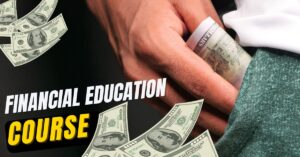Why is financial education important: check out these tips
Why is financial education important: check out these tips: How I, Rafael Morais, Realized the Power of Financial Knowledge. Let me tell you something personal right off the bat: for most of my adult life, I didn’t fully understand money.
I knew how to earn it. I knew how to spend it. But what I didn’t know was how to make it work for me. I’m Rafael Morais, and I’ve been down the road of paycheck-to-paycheck living, drowning in bills and wondering where all my hard work was going.
👉🏽Accessing this content here: I teach you how to have a good financial education and also show you step by step how you can get a credit card even with a negative score and build a financial foundation with expertise.
Back then, financial education sounded boring—something for economists or Wall Street types. But as the years went by and my responsibilities grew, I couldn’t ignore it anymore. I realized that if I wanted more out of life—security, freedom, options—I needed to understand how money truly works. That’s when I began this incredible journey of learning everything I could about personal finance. And guess what? It changed my life completely.
Now, I’m here to share what I’ve learned in a way that’s real and relatable. I want to help you avoid the mistakes I made and show you why financial education is not just important—it’s absolutely essential. In this extended guide, I’ll break things down into bite-sized pieces so that even if you’ve never read a single finance book, you’ll still come out the other side feeling more empowered. So let’s dive in, friend to friend.
Why financial education is important and how to make money work for you instead of you working for money. Find out how to earn extra income while working full time.
1. Understanding Your Money: The First Big Aha! Moment
Why is financial education important: I remember the exact moment it hit me. I was staring at my online banking app after another month of struggling to cover my bills. I had no savings. My credit card balance was growing. And even though I worked hard every single day, I felt like I was running in circles. It is very important that you set aside a portion that does not compromise your income and invest so that your money returns automatically, without you having to do anything.
That’s when I stumbled upon a blog post talking about budgeting, and it blew my mind. Wait, you mean I should actually plan how to spend my money instead of winging it? I downloaded a free budget template and started tracking every single expense. I’ll be honest—it was a wake-up call. I was spending way more on takeout, subscriptions, and impulse buys than I thought.
The first real step in financial education is just awareness. Once you know where your money is going, you can take control. I used tools like Mint and YNAB (You Need A Budget) to help me stay organized. Little by little, I adjusted my habits. I made conscious choices. And let me tell you—seeing your savings grow for the first time is an amazing feeling.
Budgeting isn’t about restriction. It’s about intention. And once I got the hang of it, I felt like I had finally started building a solid foundation for the life I actually wanted.
2. Credit, Debt, and the Game No One Teaches You
Let’s talk about something most of us learn the hard way—credit. Back in my early twenties, I thought having a credit card was like having free money. I had no idea how credit scores worked or how long bad financial decisions could follow you. I maxed out my card, made late payments, and watched my credit score plummet.
Then one day, I decided I was done being in the dark. I learned that your credit score affects everything—from getting a loan, to renting an apartment, to even job applications in some cases. I started using free tools like Credit Karma to monitor my score. I paid off my high-interest debts using the snowball method (starting with the smallest balance), and I opened a secured credit card to rebuild my score.
Little by little, it worked. I saw my score climb from the 500s into the 700s. And with better credit came better opportunities: lower interest rates, better rewards cards, and more peace of mind. Now I always tell people—understanding credit is one of the most underrated parts of financial education. Don’t ignore it like I did.
3. Why is financial education important: Saving and Emergency Funds: Your Financial Airbag
Have you ever had a car break down, lost a job unexpectedly, or needed medical care out of the blue? I have, and let me tell you, it’s scary. Before I understood financial education, I used to scramble whenever something unexpected happened. I’d borrow money, rack up credit card debt, or just hope for the best.
Then I learned about emergency funds. It’s one of those things that sounds simple but makes a world of difference. I started by saving just $500. That was my goal. And when I hit it, I aimed for $1,000. Eventually, I built up three months’ worth of living expenses. The first time I used that fund instead of swiping a credit card? It felt like financial freedom.
I used online banks like Ally and Capital One 360 that offer high-yield savings accounts to make my money grow just a little more. Setting up automatic transfers each payday made it effortless. Trust me—having an emergency fund will change your whole mindset around money. It gives you confidence. It gives you choices.
4. Investing: The Big Secret to Building Wealth
For the longest time, I thought investing was only for rich people or finance nerds. But then I read a book that changed everything—”The Simple Path to Wealth” by JL Collins. It showed me that anyone can invest, even with a small budget.
I started with apps like Robinhood, Fidelity, and Charles Schwab. These platforms made investing super easy. I bought my first stock—a single share of a tech company I loved—and it felt like I had joined a secret club. Over time, I learned about index funds, ETFs, and compound interest.
Here’s the magic: investing lets your money grow without you doing anything extra. You work hard to earn it, and then it works hard for you. I now invest a portion of every paycheck, and even though I’m not a millionaire (yet!), my net worth is growing every year. I can’t stress this enough: start investing as soon as you can. It doesn’t have to be perfect. It just has to be consistent.
5. Retirement and Long-Term Goals: Thinking Way Ahead
I used to think retirement was a topic for people in their fifties. I mean, why stress about it in your 20s or 30s, right? But then I looked at some numbers—and wow, starting early makes all the difference. That’s when I opened a Roth IRA and began contributing to my employer’s 401(k) plan.
With tools like Vanguard and Betterment, I set up long-term investment accounts with automatic deposits. I even used retirement calculators to figure out how much I’d need to live comfortably later in life. It was eye-opening. Suddenly, I wasn’t just living paycheck to paycheck—I was planning for something bigger.
Financial education gave me the courage to dream long-term. To imagine a life where I could travel, support my family, and maybe even retire early. All of that starts with a decision today.
6. Financial Independence and the Power of Choice
The ultimate goal of all of this? Freedom. That’s what financial education has given me more than anything else. It’s not just about money. It’s about peace of mind. About not having to say “yes” to every job or stress about every bill. About knowing that you’re building something solid.
I learned about the FIRE movement (Financial Independence, Retire Early), which completely blew my mind. The idea of living below your means, saving aggressively, and building a lifestyle around what truly matters—that spoke to me. I started tracking my net worth using Personal Capital and began setting real goals.
And you know what? Every small win counts. Whether it’s paying off a credit card, increasing your savings rate, or negotiating a better salary—those wins add up. They build momentum. They change your entire relationship with money.
7. Teaching Others: Why I Share My Story
Now that I’ve been through the trenches, I feel a deep responsibility to help others. That’s why I’m sharing this story. I want people to know it’s never too late. You don’t have to be a math whiz. You don’t need a finance degree. You just need curiosity and a bit of commitment.
Financial education should be taught in schools, but since it isn’t, we have to teach ourselves—and each other. I’ve helped friends create budgets, talked coworkers into starting investment accounts, and even taught my younger cousins how to manage their allowances. And every time I share what I know, I feel like I’m passing on something truly valuable.
We’re all in this together. And by lifting each other up, we create a ripple effect of financial confidence and empowerment. Why is financial education important?
My Conclusion on Why Financial Education is Important

If you’ve made it this far, let me just say: I’m proud of you. Learning about money isn’t always easy, especially when you feel overwhelmed or behind. But here’s the truth I’ve discovered—every step counts. Every decision you make today shapes the life you’ll live tomorrow.
Financial education changed my life. It gave me control. It gave me options. And it gave me hope. I, Rafael Morais, started out just trying to keep my head above water. Now, I’m building a future that’s secure, flexible, and fulfilling.
You can do the same. Start where you are. Use the tools I mentioned. Ask questions. Make mistakes and learn from them. The important thing is to start. Your future self will thank you for it.
See here how to achieve extraordinary financial freedom and increase your chances of having extra income and a high credit limit in the market!
Are you tired of struggling with low credit scores or having your name flagged and still getting denied for credit cards? My exclusive training has already helped thousands of people unlock high-limit credit cards—even with bad credit or a negative record—and it can do the same for you.
But that’s not all: you’ll also discover proven ways to create an extra income stream, giving you the financial freedom and peace of mind you deserve. Don’t wait another day to change your financial life—join now and start building the future you’ve always wanted! 👉🏽Click here to find out more




1 comment